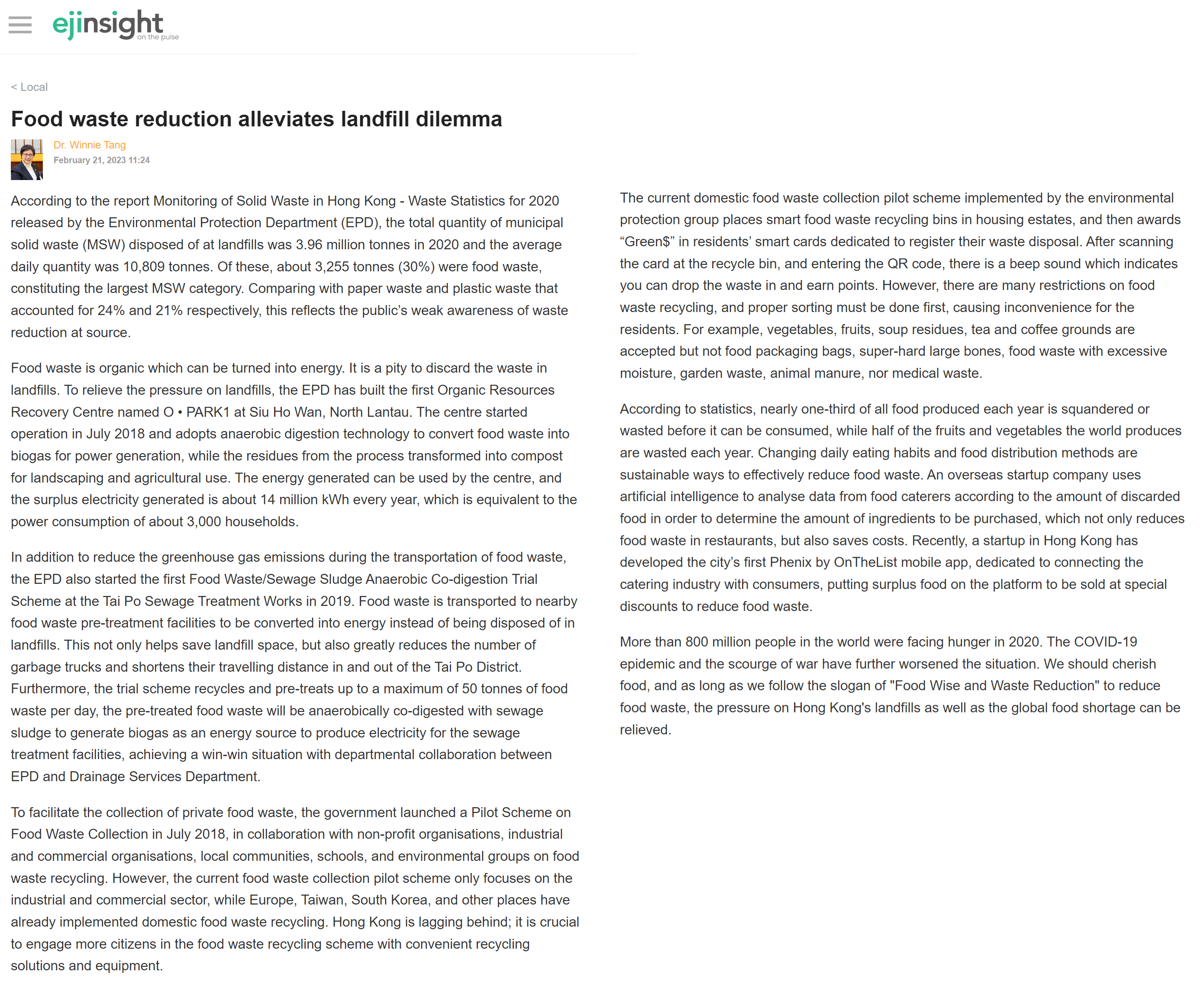網上版請按此

Food waste reduction alleviates landfill dilemma
According to the report Monitoring of Solid Waste in Hong Kong - Waste Statistics for 2020 released by the Environmental Protection Department (EPD), the total quantity of municipal solid waste (MSW) disposed of at landfills was 3.96 million tonnes in 2020 and the average daily quantity was 10,809 tonnes. Of these, about 3,255 tonnes (30%) were food waste, constituting the largest MSW category. Comparing with paper waste and plastic waste that accounted for 24% and 21% respectively, this reflects the public’s weak awareness of waste reduction at source.
Food waste is organic which can be turned into energy. It is a pity to discard the waste in landfills. To relieve the pressure on landfills, the EPD has built the first Organic Resources Recovery Centre named O • PARK1 at Siu Ho Wan, North Lantau. The centre started operation in July 2018 and adopts anaerobic digestion technology to convert food waste into biogas for power generation, while the residues from the process transformed into compost for landscaping and agricultural use. The energy generated can be used by the centre, and the surplus electricity generated is about 14 million kWh every year, which is equivalent to the power consumption of about 3,000 households.
In addition to reduce the greenhouse gas emissions during the transportation of food waste, the EPD also started the first Food Waste/Sewage Sludge Anaerobic Co-digestion Trial Scheme at the Tai Po Sewage Treatment Works in 2019. Food waste is transported to nearby food waste pre-treatment facilities to be converted into energy instead of being disposed of in landfills. This not only helps save landfill space, but also greatly reduces the number of garbage trucks and shortens their travelling distance in and out of the Tai Po District. Furthermore, the trial scheme recycles and pre-treats up to a maximum of 50 tonnes of food waste per day, the pre-treated food waste will be anaerobically co-digested with sewage sludge to generate biogas as an energy source to produce electricity for the sewage treatment facilities, achieving a win-win situation with departmental collaboration between EPD and Drainage Services Department.
To facilitate the collection of private food waste, the government launched a Pilot Scheme on Food Waste Collection in July 2018, in collaboration with non-profit organisations, industrial and commercial organisations, local communities, schools, and environmental groups on food waste recycling. However, the current food waste collection pilot scheme only focuses on the industrial and commercial sector, while Europe, Taiwan, South Korea, and other places have already implemented domestic food waste recycling. Hong Kong is lagging behind; it is crucial to engage more citizens in the food waste recycling scheme with convenient recycling solutions and equipment.
The current domestic food waste collection pilot scheme implemented by the environmental protection group places smart food waste recycling bins in housing estates, and then awards “Green$” in residents’ smart cards dedicated to register their waste disposal. After scanning the card at the recycle bin, and entering the QR code, there is a beep sound which indicates you can drop the waste in and earn points. However, there are many restrictions on food waste recycling, and proper sorting must be done first, causing inconvenience for the residents. For example, vegetables, fruits, soup residues, tea and coffee grounds are accepted but not food packaging bags, super-hard large bones, food waste with excessive moisture, garden waste, animal manure, nor medical waste.
According to statistics, nearly one-third of all food produced each year is squandered or wasted before it can be consumed, while half of the fruits and vegetables the world produces are wasted each year. Changing daily eating habits and food distribution methods are sustainable ways to effectively reduce food waste. An overseas startup company uses artificial intelligence to analyse data from food caterers according to the amount of discarded food in order to determine the amount of ingredients to be purchased, which not only reduces food waste in restaurants, but also saves costs. Recently, a startup in Hong Kong has developed the city’s first Phenix by OnTheList mobile app, dedicated to connecting the catering industry with consumers, putting surplus food on the platform to be sold at special discounts to reduce food waste.
More than 800 million people in the world were facing hunger in 2020. The COVID-19 epidemic and the scourge of war have further worsened the situation. We should cherish food, and as long as we follow the slogan of "Food Wise and Waste Reduction" to reduce food waste, the pressure on Hong Kong's landfills as well as the global food shortage can be relieved.
Dr. Winnie Tang
Adjunct Professor, Department of Computer Science, Faculty of Engineering; Department of Geography, Faculty of Social Sciences; and Faculty of Architecture, The University of Hong Kong